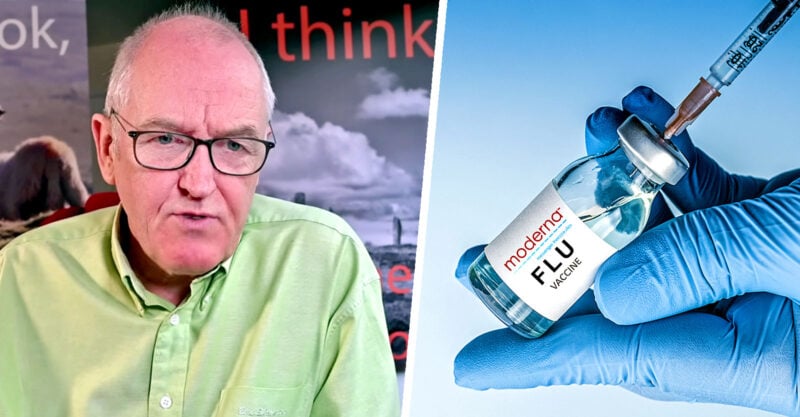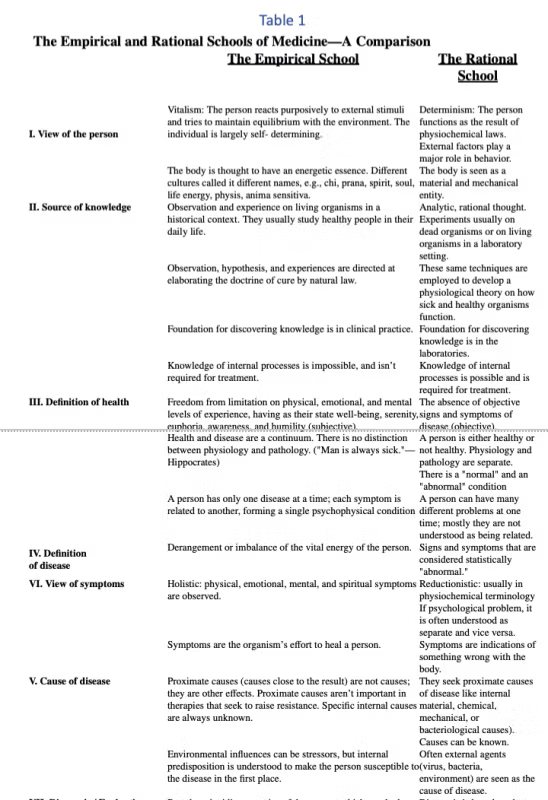UK Commits £1 Billion for Moderna’s mRNA Universal Flu Vaccine Despite Lack of Scientifically Sound Data
John Campbell, Ph.D., on his YouTube show examined the new clinical trials being conducted by the National Institutes of Health for a universal mRNA flu vaccine and questioned why contracts for new “unproved, undemonstrated, unresearched” vaccines are moving forward while basic questions about safety and efficacy remain unaddressed.
The National Institutes of Health is running a Phase 1 clinical trial on an experimental mRNA universal influenza vaccine developed by researchers at the National Institute of Allergy and Infectious Diseases’ (NIAID) Vaccine Research Center.
Although the vaccine is only in very early clinical trials, the U.K. government already has committed to a £1 billion deal with Moderna to buy the mRNA vaccines for flu and other respiratory viruses over the next 10 years, John Campbell, Ph.D., reported on his YouTube show.
“This really is quite bizarre in my view,” said Campbell, a retired professor of nursing with clinical experience in England who hosts a popular YouTube show that explains evolving science on COVID-19 and related issues.
“Why don’t we get the trial data first and then think about giving the thousand million pounds [£1 billion]” for the mass manufacture of the vaccines, he asked.
Campbell explained the clinical trial details. The claim, he said, is that the vaccine is “universal” and so will work against all flu variants — unlike existing flu vaccines that are adjusted each year depending on which flu variant is dominant.
The study will enroll 50 volunteers ages 18 through 49 at the Duke Human Vaccine Institute in Durham, North Carolina, to test an mRNA lipid nanoparticle vaccine (H1ssF-3928 mRNA-LNP) for safety and for its capacity to induce an immune response.
“They are claiming, the National Institutes of Health in the United States are claiming
that by testing 50 healthy volunteers 18 through to 49 they can assess the safety of this vaccine. This is a parody of research in my view,” Campbell said.
Three groups of 10 participants each will receive doses of 10, 25 and 50 micrograms of lipid nanoparticles containing the mRNA to make the influenza antigen.
Campbell raised two issues with the research. First, he said, it is known from Australian studies that lipid nanoparticles are so small they can circulate throughout the body rather than staying at the injection site, as originally promised — this can be dangerous.
Second, he said, the amount of mRNA injected is not directly related to the amount of antigen produced.
“This is part of the problem with this technology, how do you predict the amount of antigen that’s actually produced from a certain dose of mRNA instruction?” he asked.
The control group will receive the existing quadrivalent vaccine and researchers will compare the immunogenicity and safety of the two vaccines.
There will be follow-up appointments for up to one year. But Campbell said given the newness of the technology, he believes a longer longitudinal study would be necessary.
According to Dr. Hugh Auchincloss, acting director of the NIAID, a universal influenza vaccine would “ideally provide durable long-term immunity” and defend against a future flu pandemic.
But, Campbell said, “We know from the COVID vaccines that they weren’t preventing transmission as much as people originally thought they were,” so there is no reason to assume, without large-scale trials, that a flu vaccine would function differently.
Despite, “a large amount of unknowns” however, the U.K. has “gone headlong into this technology,” Campbell said.
“The British government’s put a thousand million into it for starters … committed to buying Moderna vaccines — unproved, undemonstrated, unresearched — but we’ve committed to buying it for the next 10 years,” he said. “This is how these people are spending our money, buying an unknown technology up front over the next 10 years.”
The U.S. and Australia have similar plans, Campbell said, despite the fact that there are many basic unanswered questions about mRNA vaccines, such as:
“How do we control the antigen dose? [We’re] not told.
“How long will the antigen be produced for? [We’re] not told.
“What’s the degree of systemic distribution? [We’re] not told.
“What’s the degree of systemic inflammation? [We’re] not told.”
Campbell said he’s concerned these governments are committing “hook, line and sinker” to a new technology before basic questions about systemic inflammation are answered.
He said that systemic blood goes everywhere in the body — to the myocardium, the lungs, the brain, the testes, the ovaries, the kidneys, and so these vaccines could have implications for all of those systems.
Campbell added:
“These are fundamental questions, based on our understanding of the circulatory system which we’ve known about for hundreds of years.
“This is not new stuff. This is not complicated science, basic questions which seem to go against what we understand about the basic science and yet seem to be being ignored.”
Watch here:
The views and opinions expressed in this article are those of the authors and do not necessarily reflect the views of Children's Health Defense.
--------------------------------------------------------------


No comments:
Post a Comment